|
|
|
Sort Order |
|
|
|
Items / Page
|
|
|
|
|
|
|
| Srl | Item |
| 1 |
ID:
168183
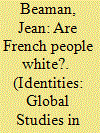

|
|
|
|
|
| Summary/Abstract |
Based on ethnographic research of France’s North African second-generation, I bring together literatures on racial formation, whiteness, and race and racism in Europe to discuss how whiteness operates in French society. I discuss how respondents must navigate a supposedly colorblind society in which whiteness is default. Because these individuals are racialized as non-white, they are not seen as French by others. I discuss how they wrestle with definitions of French identity as white and full belonging in French society as centered on whiteness. I argue that salience of whiteness is part of France’s racial project in which differences among individuals are marked without explicit state-sanctioned racial and ethnic categories. This has implications for considering how whiteness is crucial to understanding European identity more broadly, including through the rise of the Far-Right, the recent Brexit and Leave campaigns, and anti-immigration sentiment throughout Western Europe.
|
|
|
|
|
|
|
|
|
|
|
|
|
|
|
|
| 2 |
ID:
167649
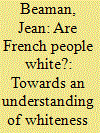

|
|
|
|
|
| Summary/Abstract |
Based on ethnographic research of France’s North African second-generation, I bring together literatures on racial formation, whiteness, and race and racism in Europe to discuss how whiteness operates in French society. I discuss how respondents must navigate a supposedly colorblind society in which whiteness is default. Because these individuals are racialized as non-white, they are not seen as French by others. I discuss how they wrestle with definitions of French identity as white and full belonging in French society as centered on whiteness. I argue that salience of whiteness is part of France’s racial project in which differences among individuals are marked without explicit state-sanctioned racial and ethnic categories. This has implications for considering how whiteness is crucial to understanding European identity more broadly, including through the rise of the Far-Right, the recent Brexit and Leave campaigns, and anti-immigration sentiment throughout Western Europe.
|
|
|
|
|
|
|
|
|
|
|
|
|
|
|
|
| 3 |
ID:
184078
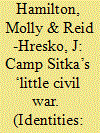

|
|
|
|
|
| Summary/Abstract |
Drawing on qualitative research conducted in the summer of 2018, we explore the role of camp programming and staff discourse in the (re)production of white ignorance at Camp Sitka, a wilderness Boy Scouts of America camp. Using epistemologies of ignorance, we examine two important pieces of nostalgic camp programming and the justifications and surprise to them among two seemingly antithetical groups of camp staff members, traditional ‘old Sitka’ conservatives and progressive ‘new Sitka’ staff. We argue that both pieces of camp programming mobilised nostalgic longing for an imagined version of the American past, made possible through the active forgetting of histories of white violence. Both nostalgia and surprise arose from and reproduced white ignorance. More specifically, both ‘nostalgia’ and ‘surprise’ were narrative distancing moves that obscured racist realities, which fuelled a cycle of ignorance that ultimately helped insulate systems of racial inequity from meaningful critique.
|
|
|
|
|
|
|
|
|
|
|
|
|
|
|
|
| 4 |
ID:
181680
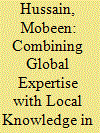

|
|
|
|
|
| Summary/Abstract |
This article traces the evolution of branded commodity advertising and consumption from corporeal health concerns to the racialisation of beauty through skin-lightening cosmetics in late colonial India. It centres two empirical foci: the marketing of personal hygiene products to Indian markets, and their racialised and gendered consumption. This article argues that the imperial economy tapped into and commodified ideals of cleanliness, beauty and fairness through marketing—ideals that continue to pervade contemporary South Asian communities. Contrary to claims that multinational corporations permeated Indian markets after the economic liberalisation of the late 1980s, there is a much deeper genealogy to the racialised imperial economy operating in European colonies. This article also examines the phenomenological underpinnings of imperial whiteness in colonial encounters to demonstrate how certain commodities appealed to Indians as ‘modern’ consumers, as well as how middle-class Indians and local entrepreneurs became active participants in the demand for, consumption and production of personal hygiene commodities.
|
|
|
|
|
|
|
|
|
|
|
|
|
|
|
|
| 5 |
ID:
114635
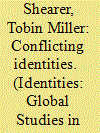

|
|
|
|
|
| Publication |
2012.
|
| Summary/Abstract |
In this essay, I argue that rather than correlating white identity and whiteness studies first with invisibility, power and privilege, white identity is more accurately correlated with overt conflict and crisis. Moreover, the study of white racial formation in one US-based but internationally focused religious organization between 1960 and 1985 also suggests that white identity is a conflict that results in power and privilege but that the power and privilege do not define the identity itself.
|
|
|
|
|
|
|
|
|
|
|
|
|
|
|
|
| 6 |
ID:
179009
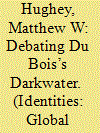

|
|
|
|
|
| Summary/Abstract |
The initial 1920 publication of W. E. B. Du Bois’s Darkwater: Voices from Within the Veil sold over 15,000 copies. Its initial 1969 reissue, and subsequent reprints, have since garnered even more sales and thousands of citations. Darkwater is now considered a classic. The centenary of the publication (1920–2020) provides an opportune moment to reflect on the book’s significance and disparate interpretations. In this article, I first examine the antecedents of Du Bois’s Darkwater. I then examine the book reviews, announcements, book club declarations, and advertisements and I subsequently map the variations of their coverage, debate, and emphases. I conclude with some thoughts on sociology’s relative dismissal of Darkwater until recent years and what sociology’s modest rediscovery of, and debates over, Du Bois portend.
|
|
|
|
|
|
|
|
|
|
|
|
|
|
|
|
| 7 |
ID:
113900
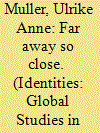

|
|
|
|
|
| Publication |
2011.
|
| Summary/Abstract |
Race and nation have been difficult concepts in Germany since the Holocaust. Although race has seemingly disappeared from public discourse, the concept is very present in the narrative construction of white German national identities. In fact in Germany, race, and more specifically whiteness, disappears into a national naming. On the basis of a qualitative study on women activists, I examine to what extent the research participants struggle with the racialized discourse on German identity and what this struggle looks like. Using John Hartigan's (2000) approach to analyzing ethnographic accounts of whiteness, I show how a racialization of German identity plays out in complex and complicated ways. On the one hand, the narratives are complicit with a racialized Germanness, yet on the other hand, the idea of a unified, white, cultural community is being challenged. To move toward a postcolonial narrative of Germanness that includes Germany's history of colonialism as well as fascism, we need to move away from race, but we also need to move toward race. A starting point would be provided by focusing on racism, not as a fringe issue of German society but rather as an urgent matter that is located at the centre of German politics and is actively shaping its history.
|
|
|
|
|
|
|
|
|
|
|
|
|
|
|
|
| 8 |
ID:
142837
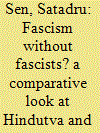

|
|
|
|
|
| Summary/Abstract |
This essay examines some aspects of Hindutva and Zionism, taking a comparative approach that underlines the ubiquity—i.e. the comparability—of fascisms in the articulation of modernity. It focuses on the imaginary of race, place and peoplehood in each ideology, the roles of majorities and minorities in the formulation of national well-being, and possible exit strategies from violently exclusivist statecraft. It explores, also, an intellectual prehistory in which Indian nationalists cultivated a fascination with Jews and Zionism as part of their understanding of a race constituted by historical damage and the imperative of repair. It argues, first, that the comparative study of fascisms is not only valid, but necessary to the politics of democracy. Second, it argues that because Indian fascism is less racialised than the Israeli version, it is more open to contestation and mitigation by the deployment of alternative imaginaries of ethnicity and nationhood.
|
|
|
|
|
|
|
|
|
|
|
|
|
|
|
|
| 9 |
ID:
185081
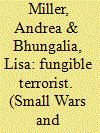

|
|
|
|
|
| Summary/Abstract |
Taking the Capitol riots of January 6 as a point of departure, this article queries the utility of abject white violence to the US security state through a focus on the latest push for domestic terrorism legislation. Drawing on the first-ever National Strategy for Countering Domestic Terrorism released by the White House in June 2021, we trace how the US security state constructs white supremacist violence as both abject and anachronistic, a creative project of history-making through which the liberal security state operationalizes that violence to bolster and expand US empire and counterinsurgency. Further, we explore how the fungibility of abject whiteness within contemporary US counterterrorism creates a metonymic power by which the foreign and domestic cohere, collapse, and diverge through the figure of the racialized terrorist to suit the needs of the imperial state. While the state’s current push for domestic terrorism legislation publicly portrays a stance of historical reconciliation and multicultural protectionism, the figure of the domestic terrorist functions as a conduit through which the violence of the state is rerouted. Through this vision of besieged multiculturalism, the liberal security state seeks to creatively refashion US empire domestically and at the global scale.
|
|
|
|
|
|
|
|
|
|
|
|
|
|
|
|
| 10 |
ID:
112395
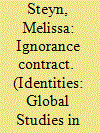

|
|
|
|
|
| Publication |
2012.
|
| Summary/Abstract |
Working with the recollections of everyday experiences of apartheid collected by the Apartheid Archives project, and drawing on the emerging theorization of ignorance in the critical philosophy of race, this article explores how an 'ignorance contract' - the tacit agreement to entertain ignorance - lies at the heart of a society structured in racial hierarchy. Unlike the conventional theorization of ignorance that regards ignorance as a matter of faulty individual cognition, or a collective absence of yet-to-be-acquired knowledge, ignorance is understood as a social achievement with strategic value. The apartheid narratives illustrate that for ignorance to function as social regulation, subjectivities must be formed that are appropriate performers of ignorance, disciplined in cognition, affect and ethics. Both white and black South Africans produced epistemologies of ignorance, although the terms of the contract were set by white society as the group with the dominant power.
|
|
|
|
|
|
|
|
|
|
|
|
|
|
|
|
| 11 |
ID:
192966
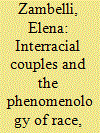

|
|
|
|
|
| Summary/Abstract |
Drawing from ethnographic research in England, this article discusses interracial, Black-white couples’ perceptions and experiences of racism and racial discrimination. Empirically, it enlarges scholarship’s prevailing focus on the effects of anti-Black racism on their social worlds, to an exploration of the relationship between race, place and space. More specifically, it discusses how partners’ differently racialised and gendered subjectivities impact their perceptions of being or not the object of interracial couple-based discrimination in public spaces, their residential choices, and their selection of leisure travel destinations. Use of an intersectional lens and the inclusion of both opposite- and same-sex couples contribute to mitigating the currently underexplored role of social class and sexuality in the shaping of interracial couples’ everyday lives. Theoretically, the article contributes to the study of whiteness as habitus and phenomenology: focusing in particular on how race mediates partners’ spatialised perceptions of dis/comfort and un/safety.
|
|
|
|
|
|
|
|
|
|
|
|
|
|
|
|
| 12 |
ID:
176018
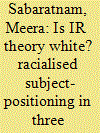

|
|
|
|
|
| Summary/Abstract |
Racism is a historically specific structure of modern global power which generates hierarchies of the human and affirms White supremacy. This has far-reaching material and epistemological consequences in the present, one of which is the production and naturalisation of White-racialised subject positions in academic discourse. This article develops a framework for analysing Whiteness through subject-positioning, synthesising insights from critical race scholarship that seek to dismantle its epistemological tendencies. This framework identifies White subject-positioning as patterned by interlocking epistemologies of immanence, ignorance, and innocence. The article then interrogates how these epistemological tendencies produce limitations and contradictions in international theory through an analysis of three seminal and canonical texts: Kenneth Waltz’s Theory of International Politics (1979), Robert Keohane’s After Hegemony (1984) and Alexander Wendt’s Social Theory of International Politics (1999). It shows that these epistemologies produce contradictions and weaknesses within the texts by systematically severing the analysis of the international system and the ‘West’ from its actual imperial conditions of possibility. The article outlines pathways for overcoming these limitations and suggests that continued inattention to the epistemological consequences of race for International Relations (IR) theory is intellectually unsustainable.
|
|
|
|
|
|
|
|
|
|
|
|
|
|
|
|
| 13 |
ID:
182406
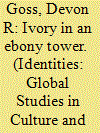

|
|
|
|
|
| Summary/Abstract |
How do white individuals establish themselves as authentic and belonging members of communities of colour? To explore this question, I examine the experiences of white students of Historically Black Colleges and Universities (HBCUs). In-depth interviews with 30 white HBCU students reveal the ways that white individuals navigate their whiteness in a space where they are deemed outsiders. Specifically, I demonstrate that white HBCU students use three strategies to differentiate themselves from whiteness writ large and establish belonging with this black community: acknowledging whiteness, wherein whites portray themselves as recognising white privilege; mitigating whiteness, wherein whites aim to balance the desire to participate in and preserve black spaces; and resisting whiteness, in which whites aim to dissociate from whiteness altogether.
|
|
|
|
|
|
|
|
|
|
|
|
|
|
|
|
| 14 |
ID:
167645


|
|
|
|
|
| Summary/Abstract |
This paper examines public discourse on race, whiteness and Muslims through an in-depth exploration of an online media controversy following the 2013 Boston Marathon bombings. On 16 April, the day after the attacks, the liberal magazine Salon.com published David Sirota’s article, ‘Let’s Hope the Boston Marathon Bomber is a White American’. A firestorm of commentary followed, with conservatives defending the profiling of Muslims, and accusing Sirota of anti-white racism. Anchored in questions of race, racism and Muslims and marked by a sharp partisan polarisation, these discussions intensified after 18 April, when the Tsarnaev brothers were identified as the perpetrators. The ensuing debate surrounding the racial identity of the Tsarnaevs displays how Muslim racialisation occurs and operates within a conservative discourse strongly committed to a colour-blind ideology. Our paper moves beyond this affirmation of literature on Muslim racialisation and sets this process within a relationally constructed and performative white racial identity.
|
|
|
|
|
|
|
|
|
|
|
|
|
|
|
|
| 15 |
ID:
167653
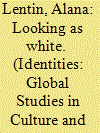

|
|
|
|
|
| Summary/Abstract |
Smartphone apps for anti-racism education and intervention are being developed by organisations in various countries. The ubiquity of smartphone use and app methodology, as Grant argues, have the potential to disrupt racial knowledges and facilitate anti-racist action. I use Nicholas Mirzoeff’s ‘zones of appearance and non-appearance’ and Derek Hook’s discussion of ‘racialising embodiment’ to discuss the potential of one such app, Everyday Racism, to challenge and disrupt white supremacy. The Australian-based app uses gamification to encourage users to participate in ‘bystander anti-racism’. However, by failing to question the neutrality of the default white bystander, the app risks reproducing hegemonic constellations of white agency versus racialized inaction. I argue that, in the zone of appearance, it is not enough to make racism apparent. It is necessary to appear. To appear first requires exposing nonappearance including the role even of the well-intentioned in maintaining it
|
|
|
|
|
|
|
|
|
|
|
|
|
|
|
|
| 16 |
ID:
168187
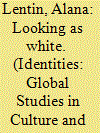

|
|
|
|
|
| Summary/Abstract |
Smartphone apps for anti-racism education and intervention are being developed by organisations in various countries. The ubiquity of smartphone use and app methodology, as Grant argues, have the potential to disrupt racial knowledges and facilitate anti-racist action. I use Nicholas Mirzoeff’s ‘zones of appearance and non-appearance’ and Derek Hook’s discussion of ‘racialising embodiment’ to discuss the potential of one such app, Everyday Racism, to challenge and disrupt white supremacy. The Australian-based app uses gamification to encourage users to participate in ‘bystander anti-racism’. However, by failing to question the neutrality of the default white bystander, the app risks reproducing hegemonic constellations of white agency versus racialized inaction. I argue that, in the zone of appearance, it is not enough to make racism apparent. It is necessary to appear. To appear first requires exposing nonappearance including the role even of the well-intentioned in maintaining it.
|
|
|
|
|
|
|
|
|
|
|
|
|
|
|
|
| 17 |
ID:
155152
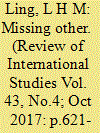

|
|
|
|
|
| Summary/Abstract |
As Andrew Linklater has shown, Europeans have decreased their tolerance for, or endorsement of, violence over the centuries. Various international and domestic conventions demonstrate the point. This accomplishment rightfully deserves celebration. But herein lies the rub. While Linklater recognises the role of imperialism and colonialism in perpetrating global violence, he does not grant equal opportunity to the Rest in contributing to the world’s new moral heights. Linklater assumes, for instance, that Las Casas never talked with indigenes to realise that they, too, warrant recognition as human beings; Catholic piety alone sufficed. The West thus towers in singular triumph, embedding International Relations (IR) in what I call Hypermasculine Eurocentric Whiteness (HEW). Still, the Other retains a sense of its Self. An effervescent spirit of play enables resilience and creativity to co-produce our world-of-worlds. Come out and play!, I urge. It’s time to shed IR’s ‘tragedy’ for the sparkle within.
|
|
|
|
|
|
|
|
|
|
|
|
|
|
|
|
| 18 |
ID:
133832
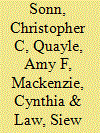

|
|
|
|
|
| Publication |
2014.
|
| Summary/Abstract |
From 2010 to 2012 a diverse group of young people participated in an oral history theatre project, Chronicles, which aimed to support them to claim a personally meaningful Australian identity. Oral history theatre was used to facilitate a process whereby the young people were able to reconnect with their personal family histories, encounter Aboriginal young people and stories, and together interview Aboriginal Elders. Through this process, they could develop new understandings of their own social identities, and meanings of and possibilities for belonging. 'Centring diverse lives, decentring whiteness' and 'a different starting point: Aboriginal ways of knowing', were the two key outcomes that we report on. Bringing people from diverse cultural and social backgrounds together to share stories of history, culture and identity, offers a unique vantage point from which to rupture dominant narratives about belonging/non-belonging and show up whiteness, and together forge a new Australian identity reflective of everyday multiculturalism.
|
|
|
|
|
|
|
|
|
|
|
|
|
|
|
|
| 19 |
ID:
174548
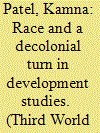

|
|
|
|
|
| Summary/Abstract |
This paper reviews and revives a longstanding conversation about race and development studies, which was prominently explored in a collection of papers on race and racism in the journal Progress in Development Studies back in 2006. This revival is timely in the context of a global call to decolonise higher education. Given the central logic of race and racism in European colonialism, and the decolonial argument that colonialism continues in the production and value of knowledge, I examine the presence and absence of race and racism in discussions of decolonising higher education and in development studies. Through a systematic review and content analysis of papers published in six major development studies journals over the past 13 years, I identify where and how race is present in current development scholarship and explore the implications of this for a decolonial turn in development studies.
|
|
|
|
|
|
|
|
|
|
|
|
|
|
|
|
| 20 |
ID:
123919
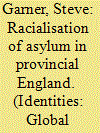

|
|
|
|
|
| Publication |
2013.
|
| Summary/Abstract |
This article examines the discursive racialisation of asylum-seekers by residents of Portishead, a small English town, a process demonstrating a classed and placed set of expressions of whiteness. I study the racialisation of a diverse group of people from the bottom-up, through an analysis of residents' letters of objection to the Government's request for planning permission to turn a building into an asylum processing centre in 2004. Three registers of language are presented: 'technocratic', 'resentful' and 'conjectural'. Racialisation is expressed through shared ideas about the type of space in Portishead, and the type of people appropriate for it. The space is constructed as white and middle-class: the asylum-seekers are produced discursively as neither and therefore as not belonging. I suggest that the phenomenon of relatively powerful groups constructing themselves as weak and beleaguered can be conceptualised as a form of 'defensive engagement'.
|
|
|
|
|
|
|
|
|
|
|
|
|
|
|
|
|
|
|
|
|